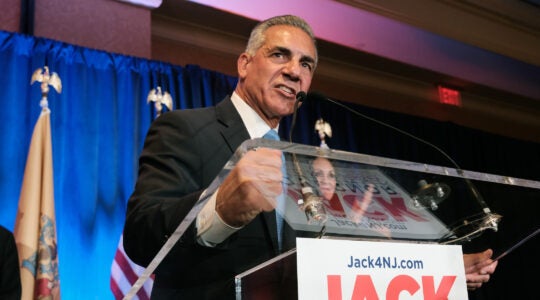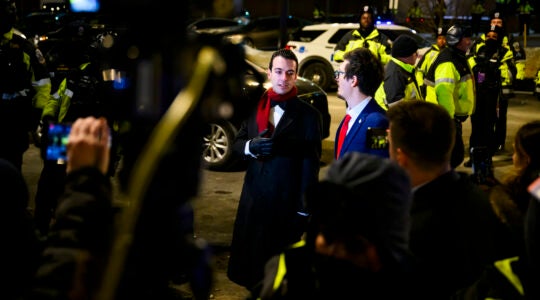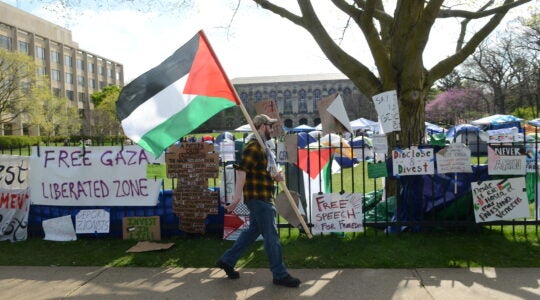WASHINGTON (JTA) — The Obama administration is working to ease Jewish concerns about its decision to take part in a preparatory meeting for considering the upcoming Durban II conference.
At issue is the upcoming Durban Review Conference, set to take place at the United Nations headquarters in Geneva in late April.
U.S. Jewish groups are worried that the gathering will be a repeat of the anti-Israel, anti-Jewish free-for-all that was the first conference in South Africa in 2001.
Canada and Israel already have said they will not participate. The Netherlands and France also are considering not attending.
But the U.S. State Department set off alarm bells Sunday in the Jewish community by announcing that it would be taking part in consultations this week ahead of the conference.
By the next day Daniel Shapiro, the National Security Council officer handling Israel affairs, had convened a conference call with Jewish communal leaders. Shapiro reinforced the message in the State Department release that the administration was still a long way off from attending the actual conference.
“Our participation in these informal negotiations does not indicate — and should not be misconstrued to indicate — that the United States will participate in April in the World Conference Against Racism itself,” the State Department statement said in its statement. “Nor does it indicate that we will necessarily participate in future preparations for the Conference. These decisions will be taken at a later date, depending on the results that we see from the negotiating process.”
The consultations, also taking place in Geneva, are shaping the draft document that will set the tone for the conference.
One signal that the Obama administration is making its concern with Israel bashing a priority is its inclusion of Felice Gaer, who directs the American Jewish Committee’s Jacob Blaustein Institute for the Advancement of Human Rights, in the U.S. delegation to the preparatory meetings. AJC officials were not available for comment.
U.N. Watch, a Geneva-based watchdog with affiliations to the AJC, reports that Iran in earlier drafting sessions led a number of countries in objecting to language that specifies Jewish suffering during the Holocaust.
“There is a notion inside this paragraph where there is talk about condemning without reservation any denial of Holocaust,” U.N. Watch quoted the Iranian delegation as saying at a January preparatory meeting. “This entails with it implicit restriction on elaboration and review, or critical examination and review and study of Holocaust — which is a very clear example of a violation of freedom of expression, a fundamental principle right for a democratic society. We suggest deletion of this paragraph.”
Among the groups represented on the call with Shapiro, there was widespread understanding with the Obama administration’s sense that it needed to test the waters, considering the president’s commitment to diplomatic outreach and thoroughly revisiting his predecessor’s policies — described by Vice President Joe Biden as “pressing the reset button.”
“I would say it’s important for the Obama administration to act in a multilateral way in order to distinguish their vision of America’s role in the world from the previous administration in order to press the reset button, as the vice president said,” said William Daroff, the director of the Washington office of the United Jewish Communities, who was in on the call.
“If that means engaging with our allies and others in order to try and change the direction of the conference, I think that is worth giving it a shot,” Daroff said. “The key will be when they get to the point that it’s clear the conference will be nothing more than an anti-Zionist, anti-Semitic hate session that the administration will loudly and emphatically walk away.”
Like Daroff, a number of other participants told JTA that they hung up reassured that the United States would pull out if it looks likes Durban II will repeat its namesake’s sins.
One thing Jewish groups will watch for, a Jewish insider said, is who wins in the “Clinton-Rice” nexus, referring to U.S. Secretary of State Hillary Rodham Clinton and Susan Rice, the U.N. ambassador. There is speculation in some circles that Clinton may favor pulling out absent a change of direction in the draft negotiations, while Rice opts for sending a delegation that would issue a strongly worded “minority report” objecting to the Israel bashing. Jewish groups would line up with Clinton in that fight, the insider said.
Other participants on the call believed that the Obama administration would do better to tweak its approach — announce its intention not to attend the conference unless it is convinced otherwise in the preparation meetings.
Malcolm Hoenlein, the executive vice chairman of the Conference of Presidents of Major American Jewish Organizations, said that the signals in preparatory meetings so far — including the continued emphasis on Israel bashing and on attempts to squelch criticism of militant Islam under the rubric of “defamation of a religion” — made Durban II a non-starter.
“We have called on them to declare now that the circumstances that have been created — the singling out of a country, the ‘defamation of a religion’ discussions — would make it impossible for the United States to participate,” Hoenlein said from Israel, where he was on a Presidents’ Conference tour. “If you want to see the conference turned around, it will only happen if the United States makes it clear it will not attend.”
According to Hoenlein, Durban II had come up in meetings with Israeli leaders.
Hoenlein, who was on the call with Shapiro, also voiced concern that if the Obama administration waited too long to announce that it was not attending, it would miss an opportunity to convince other Western nations to pull out.
The Anti-Defamation League also expressed “concern” over the decision to participate in the preparatory sessions.
“Several European countries and other nations have pressed hard to delete the offending passages without success,” the ADL said in a statement. “Many of them have said they will not participate if the changes are not made. U.S. entry into the process at this time risks extending the negotiations and delaying the withdrawal of those countries.”
That’s not the community’s consensus, said a senior Jewish organizational official who was on the call with Shapiro.
“There is a clear consensus that if it proceeds the way it did last time, the U.S. should not participate,” the official said. “There is a distinction between that and being engaged in the process.”
Human Rights First, the watchdog that has strong Jewish community credibility because of the lead it has taken in exposing anti-Semitism in Europe, is encouraging participation if only to salvage an opportunity to make U.N. member nations accountable for racism.
“We urge the administration to work to ensure that the conference advances rather than undermines the protection of fundamental rights, and to engage with others to press for that outcome,” it said in a statement.
JTA has documented Jewish history in real-time for over a century. Keep our journalism strong by joining us in supporting independent, award-winning reporting.





